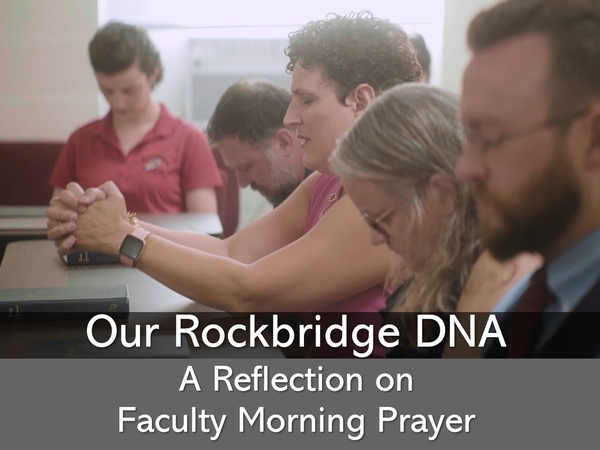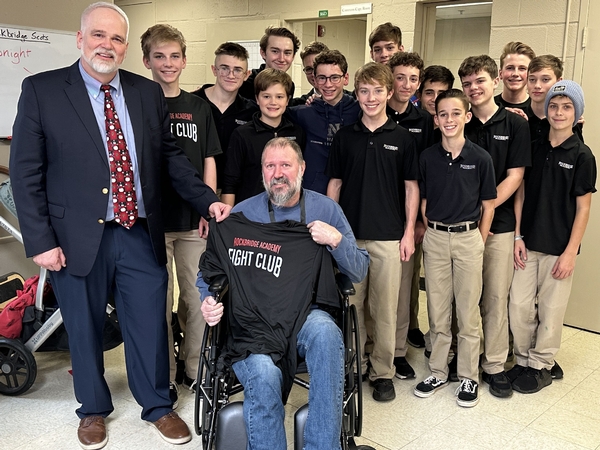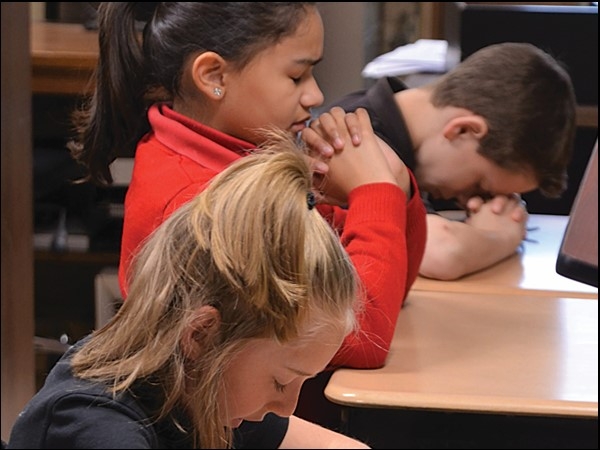Rockbridge Academy Blog
A Part of Our Rockbridge DNA: A Reflection on Faculty Morning Prayer

As students come into the building each morning, they hear a strange sound echoing throughout the hallways. It's an unfamiliar sound in schools and buildings to be happening at 7:30 in the morning: sometimes louder, sometimes softer, and sometimes a higher or lower pitch. And then it abruptly stops about three minutes later. The sound comes from Mrs. Kennedy's Physics classroom. But the students hear it every day, so they no longer raise their eyebrows and ears to figure out what it is. It's completely normal to them.
What the students hear each morning is the sound of their teachers singing a hymn a cappella. Since the door is left ajar, the sound travels. From the entrance of the school, you can just make out murmurs set to pitch; as students walk further into the building, the words become more recognizable. School hasn't started yet, so students are unloading book bags and already nibbling away at their lunches, casually hanging out with friends with heels up on their locker doors. To them, hearing adult men and women singing full voice is not strange to them. It's just what their teachers do.
#87: Holy, Holy, Holy, Lord God Almighty! / Early in the morning our song shall rise to thee; / Holy, Holy, Holy, merciful and mighty! / God in three Persons, blessed Trinity!
Each morning the Rockbridge faculty and staff gather together to sing a hymn and pray together for our students, families, and alumni. This is absolutely one of my favorite things we do. Here's how we do it.
When the bell rings at 7:30, someone picks out a number from a blue Trinity Hymnal. We've all picked one up from a bookrack as we've entered, so we're ready. It's a bonus when we're accompanied by a piano or a flute, but we're normally a cappella. Some of us try to sing harmonies—others succeed. And if it’s one of those hymns with the extra verses written beneath the final music staff, we sing all the extras too.
The collection of blue Trinity Hymnals with a solitary gold cross on the front have been gifted to us from various churches as they have updated to the newer red hymnals of the same design. Inside the front cover are stamps of the names of the donating churches. That our hymnals which allow us to sing together do not all come from one church but from several reminds me of the fellowship of families which belong to a myriad of church congregations and denominations but come together to form one Rockbridge. The Trinity Hymnal has been a new hymnal to me, but it has nearly all of my favorites.
#122: O ye heights of heav'n, adore him; / Angel hosts, his praises sing; / All dominions, bow before him, / And extol our God and King.
That our hymnals which allow us to sing together do not all come from one church but from several reminds me of the fellowship of families which belong to a myriad of church congregations and denominations but come together to form one Rockbridge.
After singing, we pray for current Rockbridge families and for alumni, selecting about five or six families each day. There's even a binder labeled "STAFF MORNING PRAYER LIST" to make sure we don't miss anyone, moving alphabetically through a roster of family names throughout the year. If you are an alumni, please know that we still pray for you by name. Your teachers delight in remembering you. For current families, please know that we pray for your entire household by name. As an Upper School teacher, praying for Grammar School students is how I have come to know the students who will one day be in my classroom.
If you are an alumni, please know that we still pray for you by name. Your teachers delight in remembering you.
We also take prayer requests for the faculty and staff for the day. It is here that we have shared in some of the greatest joys in each other's lives while also lamenting the greatest of sorrows. In a way, to pray for someone is to truly know them because it is to properly see them, their joy, or their sorrow in relation to God's ever-present care. Similarly, to be prayed for is to be known. It has meant so much to me on the days when I have asked my colleagues to pray with and for me.
It is here that we have shared in some of the greatest joys in each other's lives while also lamenting the greatest of sorrows.
The hymn, the prayer requests, the fellowship of prayer. This all happens in about ten minutes. And I'm so glad it does. It would be so natural to start the day together but to do so merely for the sake of making announcements and reminders about the day. And while we do sometimes have those, the focus is on preparing our hearts for the people and the learning of that day. As the school begins to be filled with students, it is also filled with prayer asking God to guide, to protect, to nurture our students.
I wanted to know when this rhythm began and how it had evolved, so I went about asking those teachers who were starting school days fifteen, twenty, or twenty-nine (!) years ago. All of them said the same thing: it’s one of those things that everyone remembers doing but doesn’t remember when or how it started. It struck me that singing to God and praying to him are just a part of the DNA of Rockbridge. Just as we don't remember learning to brush our teeth or how to tie a knot, at Rockbridge we sing to God and pray to him because it is part of the fabric of who we are.
#492: Take my voice, and let me sing, / Always, only, for my King. / Take my lips, and let them be / Filled with messages from thee.
It struck me that singing to God and praying to him are just a part of the DNA of Rockbridge. Just as we don't remember learning to brush our teeth or how to tie a knot, at Rockbridge we sing to God and pray to him because it is part of the fabric of who we are.
On War Stories

This article was written in March 2020 by Nathan Northup, Rockbridge Academy Bible teacher. He went to be with the Lord on November 2, 2023. His legacy will live on through the hundreds of people he loved, served, and counseled, both in his ministry to the church and in the Rockbridge community.
“Kick in the gates of hell! I’ll see you on the other side!” is the charge I imagine a great military commander bellowing out to his troops as they storm forward with swords raised high to take captive the great fortified city: Death. The Lord Jesus Christ said that the gates of Hades (death) will not prevail over His Church. As Christians, we know that we have been delivered from the dominion of sin and death and into the glorious kingdom of our Lord and thus enlisted as soldiers in the great battle, not against flesh and blood but against the principalities in the heavenly places.
In particular, here at Rockbridge Academy, our very motto is to TAKE EVERY THOUGHT CAPTIVE and make it obedient to Christ Jesus. The principle is clear throughout the Christian Scriptures that WORSHIP IS WARFARE when we consider all the oddly warlike language used to describe our journey. Every baptism, prayer, song, sermon, sharing in the body and blood of Christ, hearty joyful giving is an act of war. This war is waged with faith, hope, and love. We’ve been given weapons for offense and elements for defense. We desire that God destroy all of His and our enemies by capturing their hearts and adopting them into His family, enlisting them in His army, converting them to change their allegiances. We pray and preach and praise to this end. So then, when we gather as God’s New Covenant people for corporate worship, we have drawn our battle lines, and we go to war. All who are in this battle were once on the other side of the field and were graciously conquered by our triumphant King who leads us in His glorious procession.
This is why, every Monday in the Dialectic Bible classes, I ask for war stories. These war stories are testimonies of what God was doing in their life during the battle in the previous Lord’s Day corporate worship. Most of the time, the students testify to the Word of God given by their pastors, but we also hear stories of baptisms, confirmations, first communions, missionary testimonies, and more. I will sometimes jest that very rarely, if ever, have I had someone come back from the battle and testify to what a great encounter they had with the only true and Triune God during the tithes and offering portion of the service.
When all is said and done, I desire for my students to see the hand of God working in their midst and to rejoice in what He is doing as He works through them to destroy evil in our lives and the world around us. When we head off to worship Christ our King, let us kick in the gates of Hell so that when we have overcome on that great Day, we can look back across the battlefield and raise our swords and glasses to the One who has overcome and trampled down death by death giving us His very life that we may conquer and live with Him!
When all is said and done, I desire for my students to see the hand of God working in their midst and to rejoice in what He is doing as He works through them to destroy evil in our lives and the world around us.
Praying a 500-year Vision

“When we pray, we are producing links in the chain of ordained facts.”
C.H. Spurgeon
Recently, Rockbridge Academy hosted an Auxilium conference, where about 40 parents and pastors dedicated to starting new classical Christian schools around the country spent two days at our school taking in our culture and watching the daily grace that goes on in the classrooms. Starting a school takes vision. When I was a young teacher here many years ago, the founding board members around me talked about having a 500-year vision for Rockbridge Academy. The thinking went like this: If we really are about making a difference in the culture and in the kingdom of God through the education of children, then let’s make it a lasting vision… one that has eternal consequence.
Vision is a powerful thing. Consider the vision of Dutch statesman, Abraham Kuyper, a pastor in the Netherlands at the end of the 19th Century. He led the establishment of a new denomination that freed themselves from the state church; he founded the Free University of Amsterdam; he started and edited a newspaper. Then he served as the Netherlands Prime Minister from 1901-1905, vigorously leading his political party for over forty years until his death in 1920. Kuyper’s grand passion was to see the Christian faith impact all of the spheres of Dutch culture, even though he was cognizant of his limits working in a democratic and pluralistic framework. Despite the challenges, Kuyper said, “One desire has been the ruling passion of my life… It is this: That in spite of all worldly opposition, God’s holy ordinances shall be established again in the home, in the school, and in the State for the good of the people; to carve as it were into the conscience of the nation the ordinances of the Lord, to which Bible and Creation bear witness, until the nation pays homage again to God.”
Regardless of how you may feel about Kuyper’s brand of culture making, the fact remains that his work left a profound mark on Dutch society. A generation of godly, faithful, no-nonsense Christians salted Dutch society.
However, dark days would shake that legacy. In fact, author George Grant points out that in 1940 when the Germans invaded the Netherlands, Adolph Hitler purposefully targeted the academic and social institutions that had been established by Kuyper because Hitler saw Christendom as the arch-enemy of Nazi-ism. Kuyper’s legacy did, in fact, produce heroes of the faith who formed the backbone of Dutch resistance during the war, heroes that hid Jews from the Nazis, heroes such as the family of Corrie Ten Boom and others.
Interestingly, Rockbridge Academy holds a connection to that era and Kuyper’s legacy. Years ago, one of Rockbridge Academy’s first grade teachers left to move back to New England and care for her ailing parents—Dutch immigrants who had grown up in WWII Netherlands. About eight years ago, as that teacher’s mom finally passed away, her mom’s sister, a family member we have never met before (then in her 80s) sent a monetary gift to our school, along with a letter thanking Rockbridge Academy for our work and echoing that profound vision from a former time. I’ll share an excerpt of the note. The syntax is a little broken, and you can tell English was not her first language:
…We in our church are in the third generation of Christian [schooling] where Jesus is Lord. I’m very grateful to the Lord [for] the influence of my Dutch teachers… how they were praying teachers who’s influence is now reaching into your school through [my niece]. God is so good! We were so taught to have a good conscience toward God and man.
The school [where I grew up] was the place where, during WWII, the Germans placed the rocket launchers so we were a target for bombing. We lost 68 people in 20 minutes of chain bombing. Our teachers were there to bury the dead… [They] were there at the burial with the parents. The relationship between the teachers and the parents were so close knit that if I misbehaved at school, my mother new it before I got home. My teachers visited the families of the pupils every year to see their home life. They were like extra fathers to us, and they shaped our lives after Christ first.
This poignant letter went on to tell details about friends lost during the bombing, and the impact of the war upon the school. However, it ends with this hopeful refrain of vision:
…I may never see you on the face of this planet but I truly love you all. May the Lord bless you all the way and every day. God be with you till we meet again… May God grant that we are standing for all what God calls right with all our might. May Jesus be Lord in everything we are and do. Amen.
Have you ever stopped to think from where we stand in the stream of history that the community at Rockbridge Academy that has existed over the last 28 years may well be part of some previous generation’s 500-year vision for God’s kingdom? Could it be that the children walking Rockbridge Academy hallways today are a fulfillment of prayers uttered by faithful saints centuries ago? And despite the setbacks of war and the enemies that sometimes surround God’s people, when things look darkest, aren’t we—those who happen to be alive right now—called to take up the refrain and continue trusting that God will be faithful to that vision planted in the hearts of steadfast people? Might we pray a similar prayer for the generations to come? Let’s be known as a school that prays and pursues a 500-year vision.
Epilogue:
Among the folks attending the recent ACCS Auxilium conference at Rockbridge was a young pastor and an administrator starting a classical Christian school in Clarksburg, West Virginia. When I found out they were from Clarksburg, I relayed that my wife spent many days of childhood visiting her grandmother who lived there. I later recalled how, as a young married couple, we would visit her aging grandma in the summer, passing the time taking walks through her little Clarksburg neighborhood. I remember praying as we walked that the gospel would come to that city in fresh ways. Who knew that 30 years later, a new classical Christian school would be one tangible fulfillment of that meager prayer? Come, Lord Jesus!
Why Do We Pray?

While I (class of 2019) was still at Rockbridge Academy, every Thursday at 11:30 AM, a half dozen high school guys would trickle one by one into Mr. Lawing’s classroom, snack on our lunches, chat for a few minutes, and then, for the rest of lunch, pray. When I happened to be at Rockbridge on a Thursday visit, I had the privilege of joining that same prayer group. I was reminded of just how precious these times of prayer are. I still consider Thursday prayer one of the best parts of my Rockbridge experience.
But prayer at Rockbridge is by no means the special province of Mr. Lawing and his Thursday prayer group. The whole life of the school is soaked in prayer. Prayer at the beginning of a school day, at the beginning of class, at the beginning of lunch. Prayer on the stage at concerts and on the starting line at cross-country meets. And of course, that tearful and joyful prayer for the seniors on their last day. From start to finish, Rockbridge is a praying school.
Why is that so? Why do we pray so much at Rockbridge? Do we believe God needs constant reminders to bless us? Do we believe He needs our suggestions to run the world? Do we believe He needs our permission to act? Or do we pray simply out of duty, uttering words into the sky with no real hope, or even desire, of an answer?
None of these are the reasons God gives us to pray. God is good, needing no reminders to bless His people. God is wise, needing no suggestions to govern His creation. God is sovereign, needing no permission to work His will. And, as we are united with Christ through faith, God is our Father. He will surely hear, and answer, His children’s requests. And this is why we pray. We pray because we want an answer. We pray because we expect an answer. This is the reason our Lord Himself gave His disciples: “Ask, and it will be given to you; seek, and you will find.” Do you want to receive? Then ask! Have you asked? Then you will receive!
It’s rarely easy, though, to live as though God really does answer prayers. Perhaps we’ve prayed for many things which we haven’t received: a test aced, a game won, a relationship restored, an ailing family member healed. How can we make sense of those apparently unanswered prayers? Were we just not praying sincerely enough? Some would say so, telling every disappointed believer to simply pray harder. But Scripture gives different counsel: God is His own master. He is not bound to grant our every wish: “He does according to His will among the host of heaven, and among the inhabitants of the earth; and none can stay His hand, or say to Him, ‘What have you done?’” (Daniel 4:35). At the end of the day, God does His will, not ours.
This is not, on the surface, the most comforting answer. What it sounds like is this: when I pray, God will give me what I ask for, but only if it happens to be what He was going to do all along. It doesn’t sound like prayer actually changes anything. And in a certain sense, that’s true. Prayer doesn’t change anything, in that neither the prayers of the saints nor the curses of demons can shake Christ from His throne or erase from His heart one word of the Covenant of Redemption. God has written His story, from “In the beginning” to “Happily ever after,” and that story cannot be changed. What we often forget, though, is that our prayers themselves are part of that story.
We can’t fully wrap our minds around it, but it’s true and vitally important. When God’s people pray and He answers them, it’s not that they happen to request the very thing He was planning to do anyway. Rather, God Himself placed that prayer on their hearts, in order that they might experience His faithfulness when He answers it. Or perhaps God’s people pray and He does not give what they ask. In that case, He placed that prayer on their hearts in order that they might experience His faithfulness by waiting. This is what happened to the Apostle Paul: he says the Lord gave him a thorn in the flesh, prompting him to pray three times for relief, in order not to take it away, but to tell him, “My grace is sufficient for you.”
So why do we pray? We pray in order that we might receive. But deeper than that, we pray that we might learn God’s faithfulness. We pray that we might learn His faithfulness the pleasant way, when He hears us and leads us through green pastures. We pray that we might learn His faithfulness the hard way, when He hears us and leads us through the valleys of deep darkness. We pray that we might learn it is by His faithfulness we live, that we might learn to rest in His faithfulness and not our own strength, that we might see His faithfulness fully displayed on that day when all prayers are at last answered.
Nathan Daly, '19, currently studies computer science and math at Johns Hopkins University.
